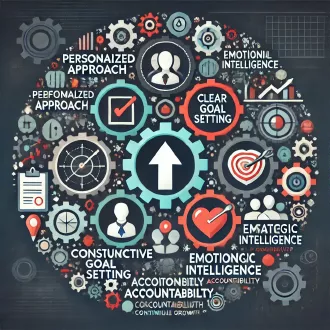Transcription Motivational role of the coach
The coach must understand his motivational role and how his interaction can influence the attitude and commitment of the coachees.
We have already mentioned motivational models and the tools of recognition and positive reinforcement, aspects that must be taken into account when implementing motivational strategies in the organization. Now we introduce you to other areas where motivation plays a crucial role: fostering authenticity and personal purpose, and boosting creativity and innovation.
Fostering Authenticity and Personal Purpose
The coach plays an important role in helping individuals discover and connect with who they are and their intrinsic purpose. Having the ability to guide individuals to reflect on their values, passions and personal goals helps individuals find deeper meaning in their work and feel more motivated to achieve their goals.
It is also a way to foster their sense of belonging by understanding how their personal values align with the values of the organization and contribute to collective success.
Not only by exploring their values but also their unique strengths and skills that drive them to reach their full potential and find a sense of personal achievement. This requires defining goals that are aligned with personal and professional purpose, maintaining a cycle of continuous challenge where they are constantly tested.
When individuals feel authentic and connected to their purpose, their motivation is more enduring and does not depend solely on external factors.
Driving creativity and innovation
Inspiring leaders and team members to think innovatively and contribute new ideas requires a mindset shift and may take a while but the results are worth it.
Here we explore some aspects to consider when developing your motivation strategy:
- Encouraging curiosity: The coach can incentivize curiosity in leaders and team members, encouraging them to question the status quo and explore new perspectives.
- Encouraging diversity of thought: Encouraging individuals to fearlessly share their different perspectives and approaches can enrich decision making and the generation of innovative ideas.
- Creating a learning environment: When motivation to learn and grow is high, leaders and team members are more willing to try new solutions and experiment.
- Valuing creativity: Emphasize the importance of creativity and lateral thinking, and make sure to recognize and reward it. This will motivate individuals to generate out-of-the-box ideas.
- Overcoming fear of failure: Applying te
rol coach




